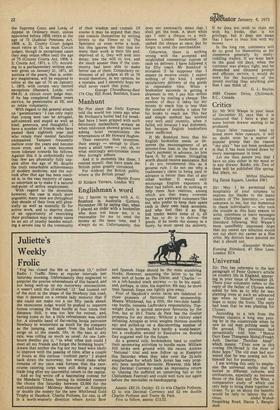Englishman's word
Sir, I hasten to agree with A. G. Bomford in Australia (Letters, November 18) by saying that, when I placed an order with a bookseller who does not know me, it Is reasonable for me to send the money at the same time, and I always do so. Unfortunately, this does not necessarily mean that I shall get the book. A short while ago I sent a cheque to a wellknown London bookseller. He cashed the cheque at once, but he forgot to send the merchandise.
Otherwise, there is nothing wrong with the accepted and established commercial custom of cash on delivery. I have followed it for fifty years. Mr Bomford is mistaken if he supposes that I expect to receive credit. I expect nothing of the kind. I expect satisfactory delivery of the goods in reasonable time. When a bookseller succeeds in getting a shipment to me, I pay him within an hour by mailing a cheque. The number of days it takes for my money to reach him is less than the number of months it takes for his books to reach me. This fair and simple method has worked very well until recently, when it failed, not because I was dishonest, but because English booksellers were inefficient.
If Mr Bomford feels that his English bookseller needs or deserves the encouragement of an interest-free loan in the form of a year's payment in advance, let him have it, by all means. Struggling worth should receive assistance. But I do not recommend this as a general rule. I do not see why a. tradesman's claim to being paid in advance is better than that of any other worker. It would only encourage English exporters in their bad habits, and do nothing to help them face realities, among which are that many overseas buyers are awkward customers like me, who prefer to keep their spare cash in their own bank accounts, and who feel that if an English trader wants some of it, all he has to do is to deliver the goods. If he needs the money in a hurry, he must speed the delivery. If he does not wish to trust me with his books, that is his privilege, but it does not mean that I have to trust him with my money.
In the long run, customers will do no good for themselves or for commerce generally by mollycoddling traders. If we went back to the good old days, when the customer was always right, and he demanded and obtained prompt and efficient service, it .would do more for the buoyancy of the pound sterling than anything else that I can think of.
G. L. Bayliss 8585 Cramer Drive, Chilliwack, B.C., Canada

































 Previous page
Previous page